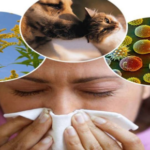1. What Are Tea Allergies
Tea allergies occur when the immune system mistakenly identifies proteins in tea as harmful substances. This can lead to allergic reactions ranging from mild to severe, affecting various parts of the body, including the skin, respiratory system, and digestive system.
2. Common Symptoms of Tea Allergies
Symptoms of tea allergies can include itching, hives, swelling, sneezing, runny nose, and digestive issues. In severe cases, an allergic reaction to tea can cause anaphylaxis, a life-threatening condition that requires immediate medical attention.
3. Types of Tea That Can Cause Allergies
All types of tea, including black, green, white, and herbal teas, can potentially cause allergic reactions. The specific allergen varies, but common culprits include proteins found in the tea leaves or added ingredients like herbs, spices, and flavorings.
4. Tea Leaves and Pollen Allergies
Tea leaves can sometimes be contaminated with pollen, which can trigger allergies in sensitive individuals. Pollen from plants such as chamomile, ragweed, and daisies can be present in herbal teas, leading to allergic reactions.
5. Flavorings and Additives in Tea
Many teas contain added flavorings, herbs, and spices that can cause allergic reactions. Common additives like cinnamon, ginger, and mint can be allergens for some people, leading to symptoms such as itching and swelling.
6. Cross-Reactivity with Other Allergens
Individuals allergic to certain plants or foods may experience cross-reactivity with tea. For example, people allergic to ragweed may also react to chamomile tea. Understanding cross-reactivity can help identify and avoid potential allergens.
7. Histamine Intolerance and Tea
Histamine intolerance can cause allergy-like symptoms when consuming certain teas. Some teas, particularly aged or fermented varieties like black tea and pu-erh tea, contain higher levels of histamine, which can trigger symptoms in sensitive individuals.
8. Symptoms of Histamine Intolerance
Symptoms of histamine intolerance include headaches, flushing, hives, digestive issues, and nasal congestion. If you experience these symptoms after drinking tea, histamine intolerance could be the cause.
9. Diagnosing Tea Allergies
Diagnosing a tea allergy involves a combination of medical history, physical examination, and allergy testing. Skin prick tests or blood tests can help identify specific allergens and confirm a tea allergy diagnosis.
10. Avoiding Allergenic Teas
The best way to manage a tea allergy is to avoid teas that contain known allergens. Reading labels carefully and choosing plain, unflavored teas can help reduce the risk of allergic reactions.
11. Alternative Beverages for Tea Allergies
Individuals with tea allergies can enjoy alternative beverages such as herbal infusions made from non-allergenic plants, rooibos tea, or chicory root coffee. These alternatives provide variety without triggering allergic reactions.
12. Managing Tea Allergies with Antihistamines
Over-the-counter antihistamines can help manage mild allergic reactions to tea. These medications block histamine, reducing symptoms like itching, hives, and nasal congestion.
13. Using Epinephrine for Severe Reactions
For severe allergic reactions, carrying an epinephrine auto-injector (EpiPen) is crucial. Epinephrine quickly reverses symptoms of anaphylaxis and can be lifesaving in emergency situations.
14. Identifying Safe Teas for Allergic Individuals
Working with an allergist can help identify safe teas for individuals with allergies. Allergy testing can pinpoint specific triggers, allowing for the selection of teas that are less likely to cause reactions.
15. Homemade Tea Blends
Making homemade tea blends using safe ingredients can help individuals with tea allergies enjoy a customized and allergen-free beverage. Ingredients like dried fruits, herbs, and spices that are known to be safe can be used to create personalized blends.
16. Allergy Symptoms in Tea: The Crossword Clue
The phrase “allergy symptom in tea” as a crossword clue might hint at symptoms like “itch,” “rash,” or “sneeze.” Understanding these clues can help crossword enthusiasts solve puzzles related to tea allergies.
17. Herbal Teas and Allergy Risks
Herbal teas, while often considered safe, can still pose allergy risks. Ingredients like chamomile, peppermint, and hibiscus are common allergens. Choosing single-ingredient herbal teas and avoiding blends can help reduce risk.
18. Reading Tea Labels Carefully
Carefully reading tea labels is essential for avoiding allergens. Look for ingredients lists that specify any added flavorings, herbs, or spices, and choose products with clear labeling to avoid accidental exposure.
19. Importance of Allergy Awareness
Raising awareness about tea allergies is important for both consumers and manufacturers. Clear labeling, better ingredient transparency, and education can help individuals make informed choices and avoid allergic reactions.
20. The Role of Tea Preparation
The method of tea preparation can also affect allergy risk. Some individuals may react to mold or bacteria present in improperly stored tea leaves. Ensuring proper storage and preparation can help mitigate these risks.
21. Seasonal Variations in Tea Allergies
Tea allergies can vary with the seasons, particularly if the allergen is related to pollen. Understanding these seasonal variations can help individuals manage their symptoms more effectively.
22. Seeking Medical Advice for Persistent Symptoms
If allergy symptoms persist despite avoiding known allergens, seeking medical advice is important. An allergist can provide comprehensive testing and guidance on managing allergies more effectively.
23. Educating Others About Tea Allergies
Educating friends, family, and colleagues about tea allergies can help create a supportive environment. Awareness and understanding can lead to better accommodations and reduced risk of accidental exposure.
24. Exploring Tea Substitutes
Exploring tea substitutes like fruit-infused water, herbal infusions without allergens, and non-caffeinated beverages can provide enjoyable alternatives for those with tea allergies.
25. Future Research on Tea Allergies
Ongoing research on tea allergies aims to improve understanding and treatment options. Advances in allergy testing, better labeling practices, and new treatment approaches hold promise for those affected by tea allergies.


